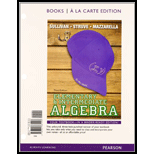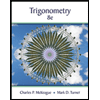
Elementary & Intermediate Algebra with Access Code
3rd Edition
ISBN: 9780321915139
Author: Michael III Sullivan
Publisher: PEARSON
expand_more
expand_more
format_list_bulleted
Question
Chapter B.3, Problem 21E
To determine
To find: The perimeter and area of the rectangle.
Expert Solution & Answer
Want to see the full answer?
Check out a sample textbook solution
Students have asked these similar questions
How to solve 2542000/64132 without a calculator?
How much is the circumference of a circle whose diameter is 7 feet?C =π d
How to solve 2542/64.132
Chapter B Solutions
Elementary & Intermediate Algebra with Access Code
Ch. B.1 - 1.if two line segments have the same length they...Ch. B.1 - Prob. 2ECh. B.1 - Prob. 3ECh. B.1 - Prob. 4ECh. B.1 - In Problems 47, classify each angle as right,...Ch. B.1 - Prob. 6ECh. B.1 - Prob. 7ECh. B.1 - Prob. 8ECh. B.1 - Prob. 9ECh. B.1 - In problems 9 and 10 find the complement and...
Ch. B.1 - Prob. 11ECh. B.1 - Prob. 12ECh. B.1 - Prob. 13ECh. B.1 - Prob. 14ECh. B.1 - Prob. 15ECh. B.1 - In Problems 1522, classify each angle as right,...Ch. B.1 - Prob. 17ECh. B.1 - In Problems 1522, classify each angle as right,...Ch. B.1 - Prob. 19ECh. B.1 - In Problems 1522, classify each angle as right,...Ch. B.1 - Prob. 21ECh. B.1 - In Problems 1522, classify each angle as right,...Ch. B.1 - Prob. 23ECh. B.1 - In Problems 2326, find the complement of each...Ch. B.1 - Prob. 25ECh. B.1 - In Problems 2326, find the complement of each...Ch. B.1 - Prob. 27ECh. B.1 - In Problems 27-30, find the supplement of each...Ch. B.1 - Prob. 29ECh. B.1 - In Problems 27-30, find the supplement of each...Ch. B.1 - Prob. 31ECh. B.1 - In Problems 31 and 32, find the measure of angles...Ch. B.2 - A triangle in which two sides are congruent is...Ch. B.2 - Prob. 2ECh. B.2 - Prob. 3ECh. B.2 - Prob. 4ECh. B.2 - Prob. 5ECh. B.2 - Prob. 6ECh. B.2 - Prob. 7ECh. B.2 - Prob. 8ECh. B.2 - Prob. 9ECh. B.2 - Prob. 10ECh. B.2 - Prob. 11ECh. B.2 - Prob. 12ECh. B.2 - Prob. 13ECh. B.2 - Prob. 14ECh. B.2 - Prob. 15ECh. B.2 - In Problems 15-18, find the measure of the missing...Ch. B.2 - Prob. 17ECh. B.2 - In Problems 15-18, find the measure of the missing...Ch. B.2 - Prob. 19ECh. B.2 - In Problems 19-22, determine the length of the...Ch. B.2 - Prob. 21ECh. B.2 - In Problems 19-22, determine the length of the...Ch. B.2 - Prob. 23ECh. B.2 - In Problems 23-26, find the length of a diameter...Ch. B.2 - Prob. 25ECh. B.2 - Prob. 26ECh. B.2 - Prob. 27ECh. B.2 - In Problems 27-30, find the length of a radius of...Ch. B.2 - Prob. 29ECh. B.2 - Prob. 30ECh. B.3 - The __________ of a polygon is the distance around...Ch. B.3 - The ____________ of a polygon is the amount of...Ch. B.3 - Prob. 3ECh. B.3 - Prob. 4ECh. B.3 - Prob. 5ECh. B.3 - Prob. 6ECh. B.3 - Prob. 7ECh. B.3 - Prob. 8ECh. B.3 - Prob. 9ECh. B.3 - Prob. 10ECh. B.3 - Prob. 11ECh. B.3 - Prob. 12ECh. B.3 - Prob. 13ECh. B.3 - Prob. 14ECh. B.3 - Prob. 15ECh. B.3 - Prob. 16ECh. B.3 - Prob. 17ECh. B.3 - Prob. 18ECh. B.3 - Prob. 19ECh. B.3 - In Problems 19-22, find the perimeter and area of...Ch. B.3 - Prob. 21ECh. B.3 - Prob. 22ECh. B.3 - Prob. 23ECh. B.3 - In Problems 23 and 24, find the perimeter and area...Ch. B.3 - Prob. 25ECh. B.3 - In Problems 25-28, find the perimeter and area of...Ch. B.3 - Prob. 27ECh. B.3 - Prob. 28ECh. B.3 - Prob. 29ECh. B.3 - In Problems 29-36, find the perimeter and area of...Ch. B.3 - Prob. 31ECh. B.3 - Prob. 32ECh. B.3 - Prob. 33ECh. B.3 - In Problems 29-36, find the perimeter and area of...Ch. B.3 - Prob. 35ECh. B.3 - In Problems 29-36, find the perimeter and area of...Ch. B.3 - In Problems 37-40, find the perimeter and area of...Ch. B.3 - In Problems 37-40, find the perimeter and area of...Ch. B.3 - Prob. 39ECh. B.3 - Prob. 40ECh. B.3 - Prob. 41ECh. B.3 - In Problems 41-44, find (a) the circumference and...Ch. B.3 - Prob. 43ECh. B.3 - Prob. 44ECh. B.3 - Prob. 45ECh. B.3 - Prob. 46ECh. B.3 - Prob. 47ECh. B.3 - Prob. 48ECh. B.4 - A ___________ is a three-dimensional solid formed...Ch. B.4 - Prob. 2ECh. B.4 - Prob. 3ECh. B.4 - Prob. 4ECh. B.4 - Prob. 5ECh. B.4 - Prob. 6ECh. B.4 - Prob. 7ECh. B.4 - Find the volume V and surface area S of a...Ch. B.4 - Prob. 9ECh. B.4 - A sphere with radius 10 inches.Ch. B.4 - Prob. 11ECh. B.4 - In Problems 11-16, find the exact and approximate...Ch. B.4 - Prob. 13ECh. B.4 - Prob. 14ECh. B.4 - Prob. 15ECh. B.4 - Find the volume V and surface area S of a square...Ch. B.4 - Prob. 17ECh. B.4 - Water for the Horses A trough for horses in the...Ch. B.4 - Prob. 19ECh. B.4 - Prob. 20ECh. B.4 - Ice Cream Cone A waffle cone for ice cream has a...Ch. B.4 - Prob. 22E
Knowledge Booster
Learn more about
Need a deep-dive on the concept behind this application? Look no further. Learn more about this topic, algebra and related others by exploring similar questions and additional content below.Similar questions
- Assume that you fancy polynomial splines, while you actually need ƒ(t) = e²/3 – 1 for t€ [−1, 1]. See the figure for a plot of f(t). Your goal is to approximate f(t) with an inter- polating polynomial spline of degree d that is given as sa(t) = • Σk=0 Pd,k bd,k(t) so that sd(tk) = = Pd,k for tk = −1 + 2 (given d > 0) with basis functions bd,k(t) = Σi±0 Cd,k,i = • The special case of d 0 is trivial: the only basis function b0,0 (t) is constant 1 and so(t) is thus constant po,0 for all t = [−1, 1]. ...9 The d+1 basis functions bd,k (t) form a ba- sis Bd {ba,o(t), ba,1(t), bd,d(t)} of the function space of all possible sα (t) functions. Clearly, you wish to find out, which of them given a particular maximal degree d is the best-possible approximation of f(t) in the least- squares sense. _ 1 0.9 0.8 0.7 0.6 0.5 0.4 0.3 0.2 0.1 0 -0.1 -0.2 -0.3 -0.4 -0.5 -0.6 -0.7 -0.8 -0.9 -1 function f(t) = exp((2t)/3) - 1 to project -1 -0.9 -0.8 -0.7 -0.6 -0.5 -0.4 -0.3 -0.2 -0.1 0 0.1 0.2 0.3 0.4 0.5…arrow_forwardAn image processor considered a 750×750 pixels large subset of an image and converted it into gray-scale, resulting in matrix gIn - a false-color visualization of gIn is shown in the top-left below. He prepared a two-dim. box filter f1 as a 25×25 matrix with only the 5×5 values in the middle being non-zero – this filter is shown in the top-middle position below. He then convolved £1 with itself to get £2, before convolving £2 with itself to get f3. In both of the steps, he maintained the 25×25 size. Next, he convolved gIn with £3 to get gl. Which of the six panels below shows g1? Argue by explaining all the steps, so far: What did the image processor do when preparing ₤3? What image processing operation (from gin to g1) did he prepare and what's the effect that can be seen? Next, he convolved the rows of f3 with filter 1/2 (-1, 8, 0, -8, 1) to get f4 - you find a visualization of filter f 4 below. He then convolved gIn with f4 to get g2 and you can find the result shown below. What…arrow_forward3ur Colors are enchanting and elusive. A multitude of color systems has been proposed over a three-digits number of years - maybe more than the number of purposes that they serve... - Everyone knows the additive RGB color system – we usually serve light-emitting IT components like monitors with colors in that system. Here, we use c = (r, g, b) RGB with r, g, bЄ [0,1] to describe a color c. = T For printing, however, we usually use the subtractive CMY color system. The same color c becomes c = (c, m, y) CMY (1-c, 1-m, 1-y) RGB Note how we use subscripts to indicate with coordinate system the coordinates correspond to. Explain, why it is not possible to find a linear transformation between RGB and CMY coordinates. Farbenlehr c von Goethe Erster Band. Roſt einen Defte mit fergen up Tübingen, is et 3. Cotta'fden Babarblung. ISIO Homogeneous coordinates give us a work-around: If we specify colors in 4D, instead, with the 4th coordinate being the homogeneous coordinate h so that every actual…arrow_forward
- Can someone provide an answer & detailed explanation please? Thank you kindly!arrow_forwardGiven the cubic function f(x) = x^3-6x^2 + 11x- 6, do the following: Plot the graph of the function. Find the critical points and determine whether each is a local minimum, local maximum, or a saddle point. Find the inflection point(s) (if any).Identify the intervals where the function is increasing and decreasing. Determine the end behavior of the graph.arrow_forwardGiven the quadratic function f(x) = x^2-4x+3, plot the graph of the function and find the following: The vertex of the parabola .The x-intercepts (if any). The y-intercept. Create graph also before solve.arrow_forward
- what model best fits this dataarrow_forwardRound as specified A) 257 down to the nearest 10’s place B) 650 to the nearest even hundreds, place C) 593 to the nearest 10’s place D) 4157 to the nearest hundreds, place E) 7126 to the nearest thousand place arrow_forwardEstimate the following products in two different ways and explain each method  A) 52x39 B) 17x74 C) 88x11 D) 26x42arrow_forward
- Find a range estimate for these problems A) 57x1924 B) 1349x45 C) 547x73951arrow_forwardDraw the image of the following figure after a dilation centered at the origin with a scale factor of 14 退 14 12- 10 5- + Z 6 的 A X 10 12 14 16 18 G min 3 5arrow_forwardkofi makes a candle as a gift for his mom. The candle is a cube with a volume of 8/125 ft cubed. Kofi wants to paint each face of the candle exepct for the bottom. what is the area he will paint?arrow_forward
arrow_back_ios
SEE MORE QUESTIONS
arrow_forward_ios
Recommended textbooks for you
 Elementary Geometry For College Students, 7eGeometryISBN:9781337614085Author:Alexander, Daniel C.; Koeberlein, Geralyn M.Publisher:Cengage,
Elementary Geometry For College Students, 7eGeometryISBN:9781337614085Author:Alexander, Daniel C.; Koeberlein, Geralyn M.Publisher:Cengage, Trigonometry (MindTap Course List)TrigonometryISBN:9781305652224Author:Charles P. McKeague, Mark D. TurnerPublisher:Cengage Learning
Trigonometry (MindTap Course List)TrigonometryISBN:9781305652224Author:Charles P. McKeague, Mark D. TurnerPublisher:Cengage Learning

Elementary Geometry For College Students, 7e
Geometry
ISBN:9781337614085
Author:Alexander, Daniel C.; Koeberlein, Geralyn M.
Publisher:Cengage,

Trigonometry (MindTap Course List)
Trigonometry
ISBN:9781305652224
Author:Charles P. McKeague, Mark D. Turner
Publisher:Cengage Learning
what is Research Design, Research Design Types, and Research Design Methods; Author: Educational Hub;https://www.youtube.com/watch?v=LpmGSioXxdo;License: Standard YouTube License, CC-BY